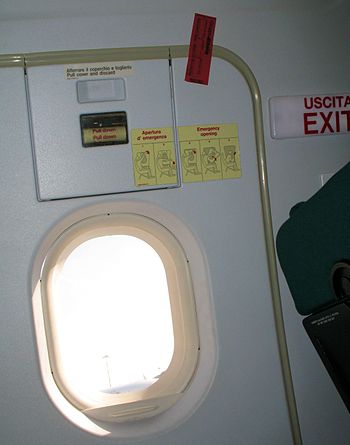Unbroken seal on the emergency exit door of a passenger airplane
(Photo credit: Wikipedia)
A question often asked by anxious airplane passengers is this: What is the safest seat in an airplane? The answer: none. Because accidents can erupt at any spot within the aircraft.
Some people are of the opinion that the nearer one is seated to an emergency exit, the safer one is. Sadly, that is not absolutely true. A fire can start near the emergency exit as in any place within the plane. And if the emergency exit is jammed, then the person sitting nearest it is in as much of the same fix as the one sitting farthest from it.
Regardless of where the passenger is seated inside the aircraft, the risks to one’s safety is greatly minimized by one thing above all else: by being alert and aware of one’s surroundings.
Being alert means being watchful and attentive. Note the location of all exits. Listen to all pre-flight and in-flight instructions. Do not drink too much. Use common sense and try not to do anything that will be detrimental to your own safety, as well as to that of others, such as having too many or too heavy carry-on luggage, spilling hot drinks, being careless with pointed objects or things with sharp edges, and the like. Again, use common sense.
Airplane accidents are rare, despite the fears and misgivings surrounding air travel. But if one does occur during the flight, it is very important for the passenger to stay calm and not to panic. Fear is a highly contagious disease. Many casualties in accidents, even those that happened on land, could have been prevented had the panic been contained. Thus, in case of an accident, take a deep breath, keep the tone of voice down and follow the line.
There is no such thing as the safest seat in the plane. But any passenger can always make his or hers the safest seat if he or she chooses to, wherever he or she is seated. Creating the sense of safety within one’s self, after all, is a mind game.
